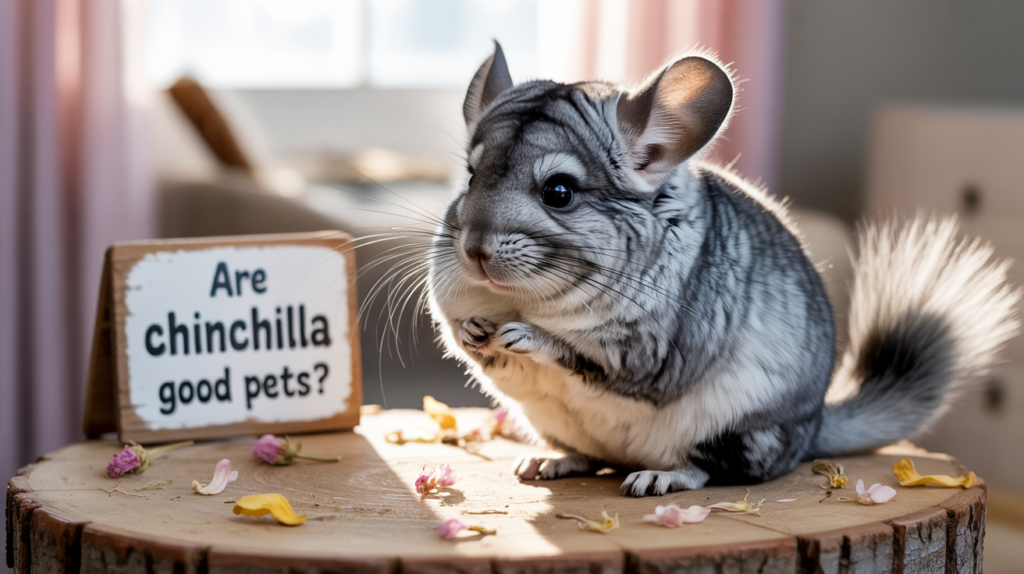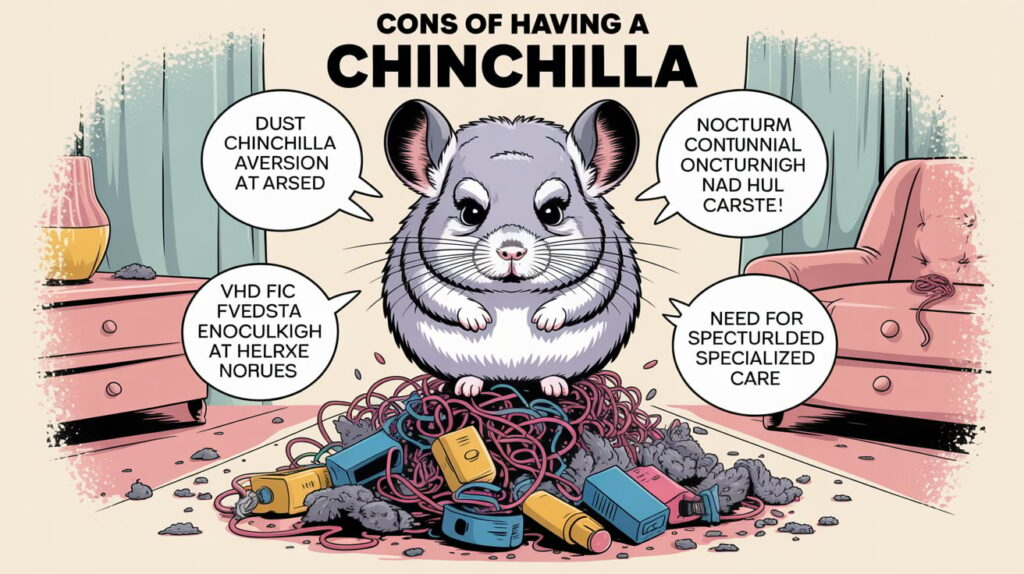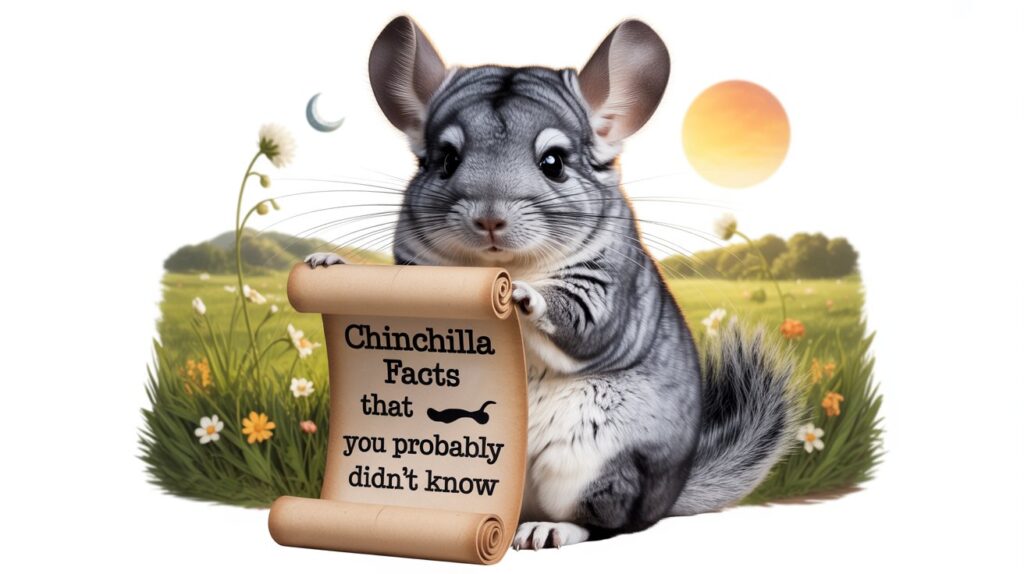Chinchillas are cute, fluffy creatures that have captured the hearts of many animal lovers. But are chinchilla good pets for everyone? Before bringing one home, it is important to understand their unique needs, habits and personality. These gentle rodents come with both rewards and challenges, and knowing what to expect can help you make the right choice.
So why are playful good pets, and are they a good fit for your lifestyle? Let’s dive into everything you need to know about keeping a chinchilla as a pet from their behavior and care to the pros and cons.

Table of Contents
What Is a Chinchilla?
Chinchillas are small rodents native to the Andes Mountains of South America. Known for their incredibly soft and dense fur, chinchillas have adapted to the cold, rocky environment where they live in colonies. Today, they are kept as exotic pets and have become quite popular among people looking for a quite, low-smelling companion.
They have long bushy tails, large ears and are usually grey, although other colours such as beige and white also exist. Unlike dogs or cats, they require special care and are best suited to attentive owners. Chinchillas make good pets for people who are patient, gentle, and willing to learn their needs.
Chinchilla Behavior and Personality
Chinchillas have unique personalities. They are often shy at first but can become friendly and curious over time, especially if handled gently and consistently.
Are Chinchillas Friendly Pets?
Yes, chinchillas can be very friendly once they get along with their owners. They show affection in different ways than dogs or cats by sitting close, climbing on you, or accepting treats. Most do not enjoy prolonged cuddling but can tolerate brief handling. Depending on their friendship:
- Regular positive interactions
- Respect for their boundaries
- A calm, quiet environment
Active and Playful Nature
Chinchillas are especially active at night. They need:
- Jumping and climbing area (minimum 3 level cage)
- Daily supervised playtime outside their walls
- Chew toys for dental health
- Puzzle feeder for mental stimulation
Signs of a happy chinchilla include:
- Popcorning (jumps for joy)
- Curiosity about the surroundings
- Willingness to communicate
Why Are Chinchilla Good Pets?
There are many reasons why chinchillas make good pet owners around the world.
Low Odor and Cleanliness
Unlike many rodents, chinchillas produce very little smell. They use a dust bath instead of water to keep themselves clean, and their cages usually do not smell if cleaned regularly.
Unique and Soft Fur
One of the most attractive features of chinchillas is their luxurious fur. It is the softest of land animals. Their fur is so thick that parasites like fleas cannot survive in it. But keep in mind, their fur is sensitive too never get it wet.
Quiet Companions
Chinchillas are generally silent pets. They may make soft chirping noises, but you wont hear loud squeals or screams. This makes them perfect for apartments or homes where noise is a concern.
Cons of Having a Chinchilla

Despite their charm, chinchillas may not be the right pet for everyone.
Need for Special Housing
Chinchillas need large, multi-level cages with room and space to jump. A small hamster cage will not work. They also overheat easily temperatures above 75°F (24°C) can be dangerous, requiring a cool, climate controlled room.
Fragile and Sensitive
Their bones are fragile, and can be easily injured if handled in properly. They also do not tolerate rough play, which means they are not ideal for small children.
Nocturnal lifestyle
Chinchillas are most active at night and may make soft sounds or jump around their cages when everyone else is sleeping. This can be a problem if their cage is near your bedroom.
Are chinchilla Good Pets for Kids?
This is a very common concern. Are chinchilla good pets for children? In general, chinchillas are not ideal for small children due to their delicate bodies and need for gentle handling. However, older children who understand how to be calm and responsible may enjoy the company of a chinchilla. Parental supervision is essential.
Daily Chinchilla Care Essentials
Chinchilla Diet and Feeding
Adequate feeding and feeding of chinchillas is very important for their health. They require high-quality grass, special chinchilla pellets and unlimited access to clean water. Treats such as dried rose hips or small pieces of apple should be given sparingly.
Avoid sugary or fatty foods as their digestive system is sensitive. A balanced diet keeps their teeth and gut healthy.
Daily dust baths help keep their fur clean, and the cage should be cleaned every day with a thorough weekly cleaning.
Also read about: Chinchilla Diet Plan
How Long Do Pet Chinchillas Live?
One of the many reasons chinchillas make good pets is their longevity. But exactly, how long do pet chinchillas live? In captivity, finches can live anywhere from 10 to 15 years, and sometimes even longer with the best care. This makes them a long term commitment especially compared to other small pets.
Common Health Problems in Chinchillas
Chinchillas can develop health issues if not cared for properly. Some problems include:
- Digestive problems – bloating, diarrhea, or constipation from poor diet.
- Dental problems – overgrown teeth due to lack of chewing.
- Fur and skin conditions – fur loss, fungal infections, or mites.
- Heatstrike – overheating in hot temperatures.
- Respiratory infections – due to dust or drafts.
- Urinary stones – from excess calcium in the diet.
- Fragile bones – can break easily.
Conclusion
So, are chinchilla good pets for you? If you are looking for a quiet, clean, and unique pet and are willing to provide the proper environment and care, a chinchilla might be perfect. But if you are seeking a cuddly animal for a child or do not have the time to meet their needs, you may want to consider a different pet. Finally, chinchillas make good pets for calm, responsible owners who are ready for a long term commitment.
FAQs
1. Can chinchilla live alone?
They can, but many enjoy having another chinchilla for company just make sure they are properly introduced.
2. Do chinchillas bite?
Only if scared or threatened. With gentle care, biting is rare.
3. Do chinchillas like to be held?
Most prefer not to be held for long. They enjoy being near you but not cuddled tightly.
4. Is a chinchilla better than a hamster?
It depends. Chinchillas live longer are cleaner and less smelly but they need more space and time.


